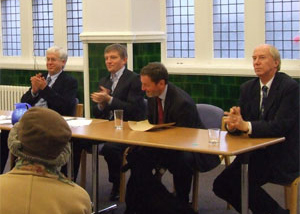
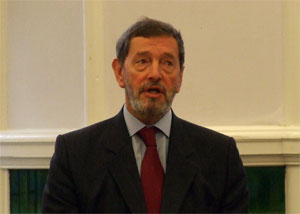 David questioned how politicians can explain why they are in politics and what they're trying to achieve, and spoke of the need to engage people, fearful of the changes underway because of progress in science and IT such as discoveries about DNA, and evolving mobile phone technology.
He argued that there is a national mood of doom and gloom following the summer of "floods, pestilence, inflation and Northern Rock", (after the football results and HMRC's CDs lost in the post, Leith & North is slightly more inclined to agree with him,) which has left us "as miserable as The Sun newspaper".
David questioned how politicians can explain why they are in politics and what they're trying to achieve, and spoke of the need to engage people, fearful of the changes underway because of progress in science and IT such as discoveries about DNA, and evolving mobile phone technology.
He argued that there is a national mood of doom and gloom following the summer of "floods, pestilence, inflation and Northern Rock", (after the football results and HMRC's CDs lost in the post, Leith & North is slightly more inclined to agree with him,) which has left us "as miserable as The Sun newspaper".Policians have a role to "lift people with an idea of the challenges we face over the next 10 to 15 years" and to address the "sense of disempowerment leading to disenegagement and disenfranchisement". There is a need to radicalise the some 20% to 40% of people who don't vote "without being so radical as to alienate the 60% who do turn out", especially "when a very small shift among those that do vote, can make the difference between winning and losing". This gives politicians a complete sense of contradiction to deal with, and this is why Gordon Brown is right to focus on questions of identity and values.
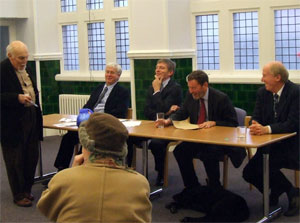
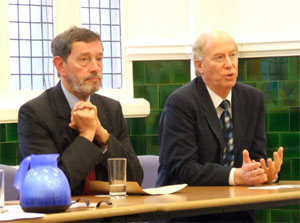 We
need to engage with the challenges of the future and the implications of
IT and embryology, whilst also addressing subliminal fears of migration and
terrorism - the apocalyptic view of doom and gloom. David wondered if we
couldn't have a "Shadow Parliament" to debate the ideas and challenges
we need to face in the future, freeing up Westminster to debate and legislate
over the issues of the NOW, such as education and embyology.
Answers to some of the questions put to David
Blunkett and the panel
We
need to engage with the challenges of the future and the implications of
IT and embryology, whilst also addressing subliminal fears of migration and
terrorism - the apocalyptic view of doom and gloom. David wondered if we
couldn't have a "Shadow Parliament" to debate the ideas and challenges
we need to face in the future, freeing up Westminster to debate and legislate
over the issues of the NOW, such as education and embyology.
Answers to some of the questions put to David
Blunkett and the panel
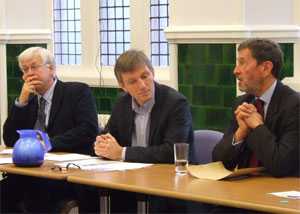 Asked
whether we needed to fear the grand scale of an over-powerful state more than
scattered terrorists, David replied that the greater the participation of
the public in public life, the less we need to fear the State. He urged us to
have faith in our democracy, and warned that private enterprise is to be feared
as well, especially as they already know a lot about us. He also described how
legislation he put forward after September 11th 2001 was improved by Parliamentary
discussion.
Asked
whether we needed to fear the grand scale of an over-powerful state more than
scattered terrorists, David replied that the greater the participation of
the public in public life, the less we need to fear the State. He urged us to
have faith in our democracy, and warned that private enterprise is to be feared
as well, especially as they already know a lot about us. He also described how
legislation he put forward after September 11th 2001 was improved by Parliamentary
discussion.
Asked about the divide between rich and poor, David pointed out that it is now "medically proven" that work is "good for us"; not only is work good for individuals, but that it is good for children to see parents working, as it provides them with a positive role model, so he "believes in supporting parents into work strongly". The structures of apprenticehship have been lost, but we can place greater emphasis on the "tutoring and mentoring of young men growing up whilst avoiding chauvinism", whilst teaching responsibilty and recognition of the consequences of their actions.
On the question "Blair or Brown", he gave the standard answer that the Labour movement is fortunate to have produced two such major figures in a generation.
On the West Lothian Question, he gave the view that "regionalisation is pretty dead in England", and that the question should be how we replicate the successful regionalisation of Europe, and how to create dynamic bottom up structures.
Asked for an example of a current issue about which Labour could take a greater lead in forming opinion, David cited the aging population and how we are not facing people with some of the problems - "how we sustain people in retirement, to have a decent standard of living and maintain social cohesion". We are not looking at the consequences for health and dependency.
Professor Sir Bernard Crick closed proceedings by thanking David for facing a "potentially difficult audience". He noted that he didn't always agree with his old friend,(they cowrote "Aims and Values of Democratic Socialism" some 20 years ago,) but that David had captured the public's imagination, because he was not a "grey man".
Wikipedia article about David Blunkett >>>